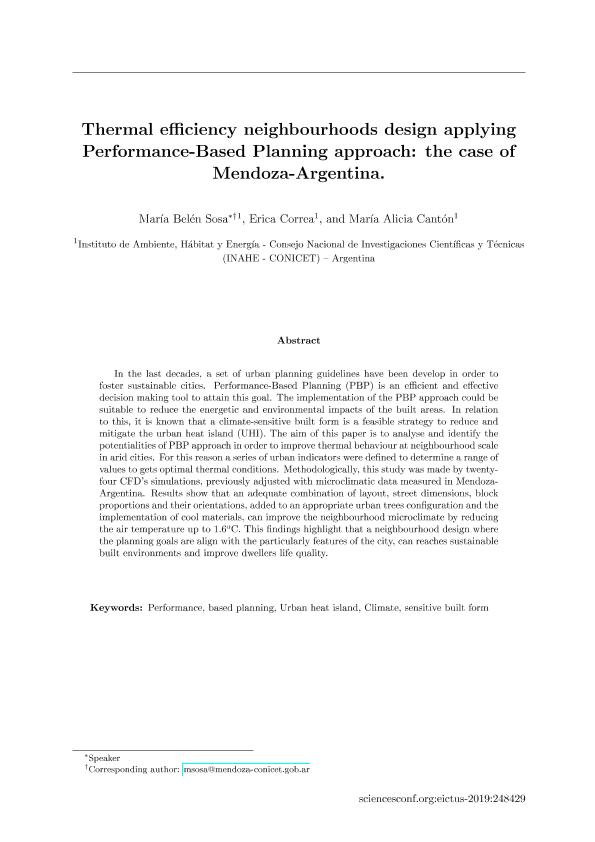Evento
Thermal efficiency neighbourhoods design applying performance-based planning approach: the case of Mendoza-Argentina
Tipo del evento:
Conferencia
Nombre del evento:
European International Conference on Transforming Urban Systems (EICTUS-2019)
Fecha del evento:
26/06/2019
Institución Organizadora:
Université de Strasbourg;
Título del Libro:
Proceedings of the European International Conference on Transforming Urban System. Environment-Sustainability
Editorial:
Zone Atelier Environnementale Urbaine
ISBN:
978-0-470-97600-5
Idioma:
Inglés
Clasificación temática:
Resumen
In the last decades, a set of urban planning guidelines have been develop in order to foster sustainable cities. Performance-Based Planning (PBP) is an efficient and effective decision making tool to attain this goal. The implementation of the PBP approach could be suitable to reduce the energetic and environmental impacts of the built areas. In relation to this, it is known that a climate-sensitive built form is a feasible strategy to reduce and mitigate the urban heat island (UHI). The aim of this paper is to analyse and identify the potentialities of PBP approach in order to improve thermal behaviour at neighbourhood scale in arid cities. For this reason a series of urban indicators were defined to determine a range of values to gets optimal thermal conditions. Methodologically, this study was made by twenty-four CFD?s simulations, previously adjusted with microclimatic data measured in Mendoza-Argentina. Results show that an adequate combination of layout, street dimensions, block proportions and their orientations, added to an appropriate urban trees configuration and the implementation of cool materials, can improve the neighbourhood microclimate by reducing the air temperature up to 1.6oC. This findings highlight that a neighbourhood design where the planning goals are align with the particularly features of the city, can reaches sustainable built environments and improve dwellers life quality.
Palabras clave:
PERFORMANCE BASED-PLANNING
,
URBAN HEAT ISLAND
,
CLIMATE SENSITIVE
,
BUILT FORM
Archivos asociados
Licencia
Identificadores
Colecciones
Eventos(INAHE)
Eventos de INSTITUTO DE AMBIENTE, HABITAT Y ENERGIA
Eventos de INSTITUTO DE AMBIENTE, HABITAT Y ENERGIA
Citación
Thermal efficiency neighbourhoods design applying performance-based planning approach: the case of Mendoza-Argentina; European International Conference on Transforming Urban Systems (EICTUS-2019); Strasbourg; Francia; 2019; 99-99
Compartir




